Impact of Digital Technology in Hospitality: Hilton Hotel
VerifiedAdded on 2020/10/22
|11
|2418
|323
Project
AI Summary
This project proposal examines the influence of digital technology on the hospitality sector, with a specific focus on the Hilton Hotel. The study includes an introduction outlining the research background, aims, objectives, and rationale. A literature review explores existing research on digital technology's impact. The methodology section details the research approach (inductive), philosophy (interpretivism), design (exploratory), data collection methods (primary and secondary), sampling techniques (probability), and data analysis methods (qualitative and quantitative). Ethical considerations and a Gantt chart are also included. The conclusion summarizes the findings, emphasizing the crucial role of digital technology in the hospitality sector, and the references section lists the sources used.
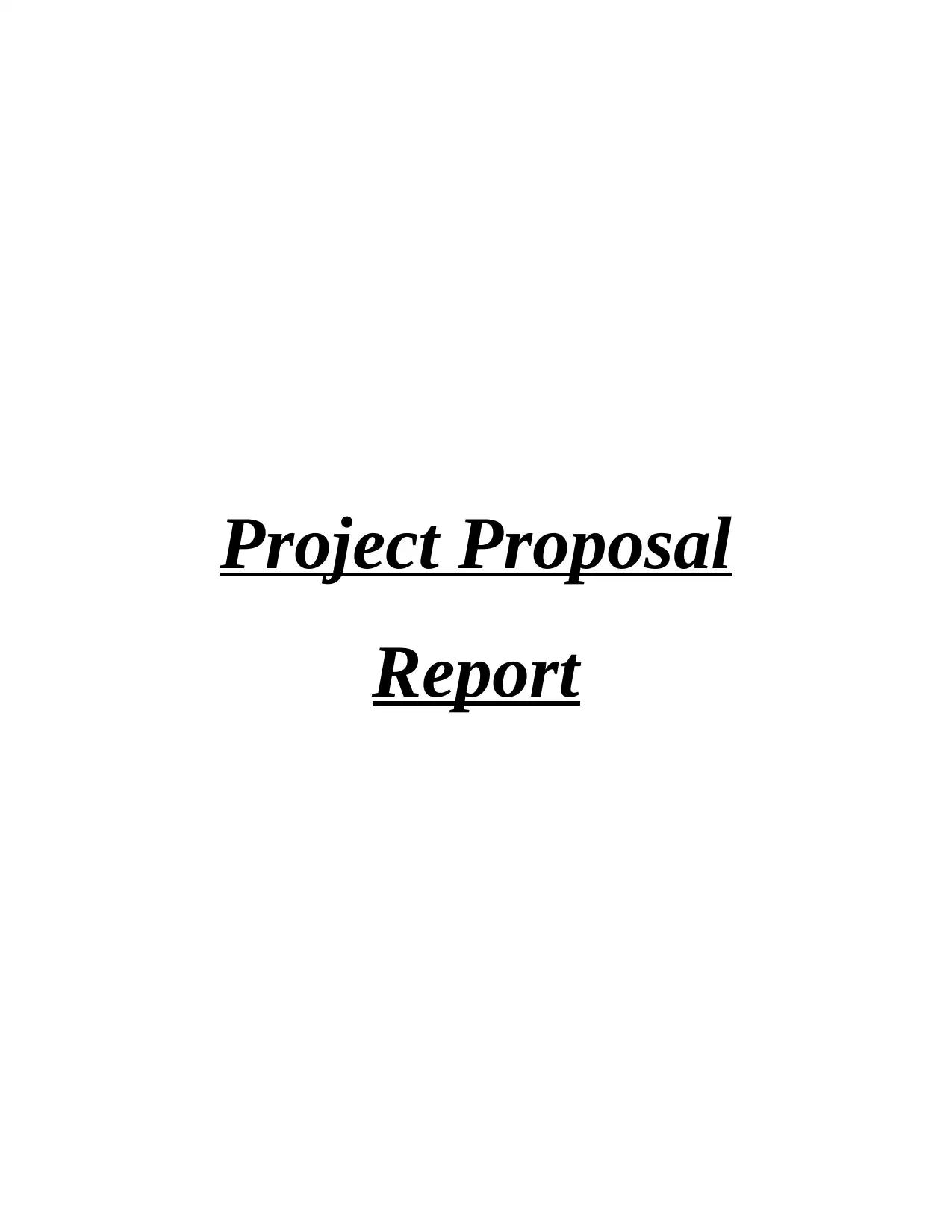
Project Proposal
Report
Report
Paraphrase This Document
Need a fresh take? Get an instant paraphrase of this document with our AI Paraphraser
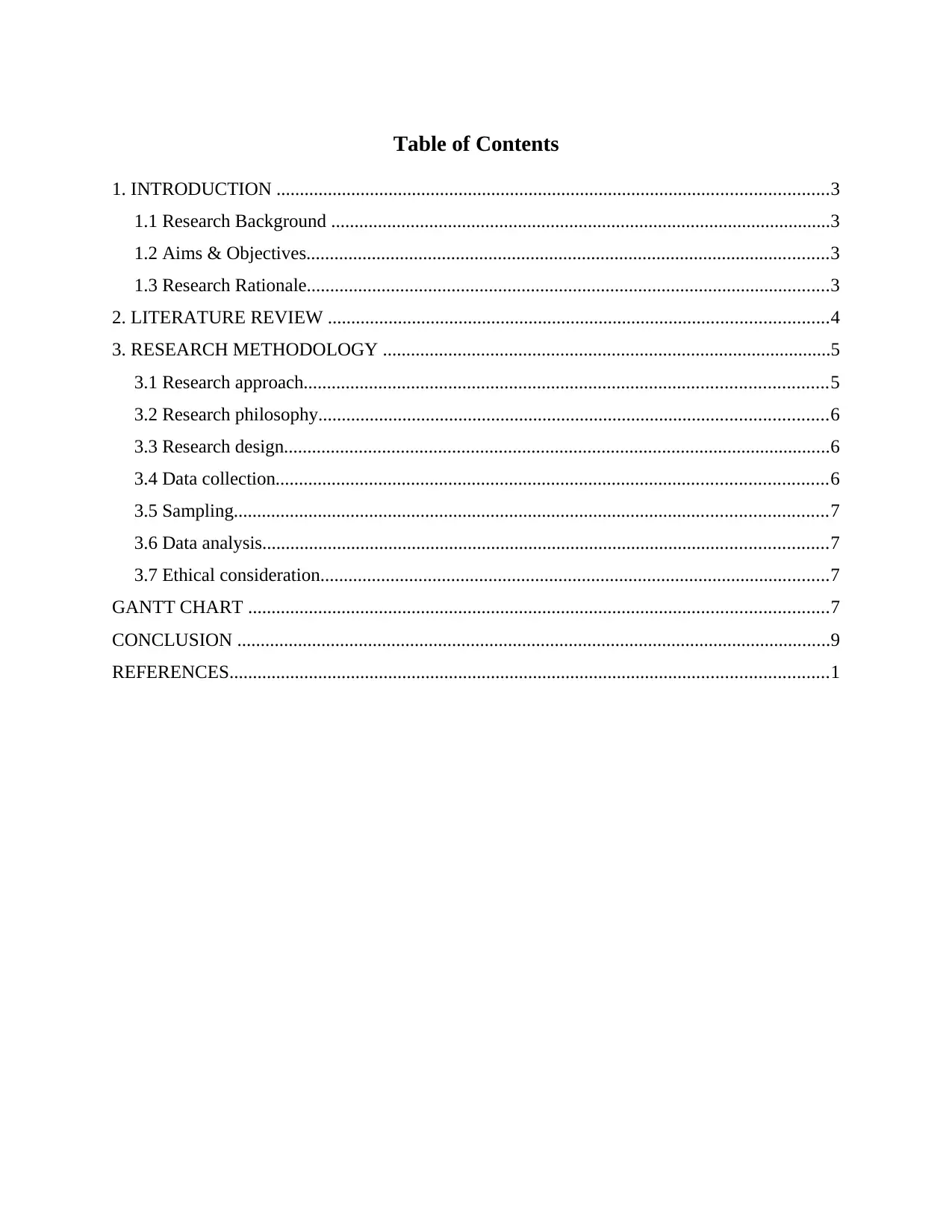
Table of Contents
1. INTRODUCTION ......................................................................................................................3
1.1 Research Background ...........................................................................................................3
1.2 Aims & Objectives................................................................................................................3
1.3 Research Rationale................................................................................................................3
2. LITERATURE REVIEW ...........................................................................................................4
3. RESEARCH METHODOLOGY ................................................................................................5
3.1 Research approach................................................................................................................5
3.2 Research philosophy.............................................................................................................6
3.3 Research design.....................................................................................................................6
3.4 Data collection......................................................................................................................6
3.5 Sampling...............................................................................................................................7
3.6 Data analysis.........................................................................................................................7
3.7 Ethical consideration.............................................................................................................7
GANTT CHART ............................................................................................................................7
CONCLUSION ...............................................................................................................................9
REFERENCES................................................................................................................................1
1. INTRODUCTION ......................................................................................................................3
1.1 Research Background ...........................................................................................................3
1.2 Aims & Objectives................................................................................................................3
1.3 Research Rationale................................................................................................................3
2. LITERATURE REVIEW ...........................................................................................................4
3. RESEARCH METHODOLOGY ................................................................................................5
3.1 Research approach................................................................................................................5
3.2 Research philosophy.............................................................................................................6
3.3 Research design.....................................................................................................................6
3.4 Data collection......................................................................................................................6
3.5 Sampling...............................................................................................................................7
3.6 Data analysis.........................................................................................................................7
3.7 Ethical consideration.............................................................................................................7
GANTT CHART ............................................................................................................................7
CONCLUSION ...............................................................................................................................9
REFERENCES................................................................................................................................1
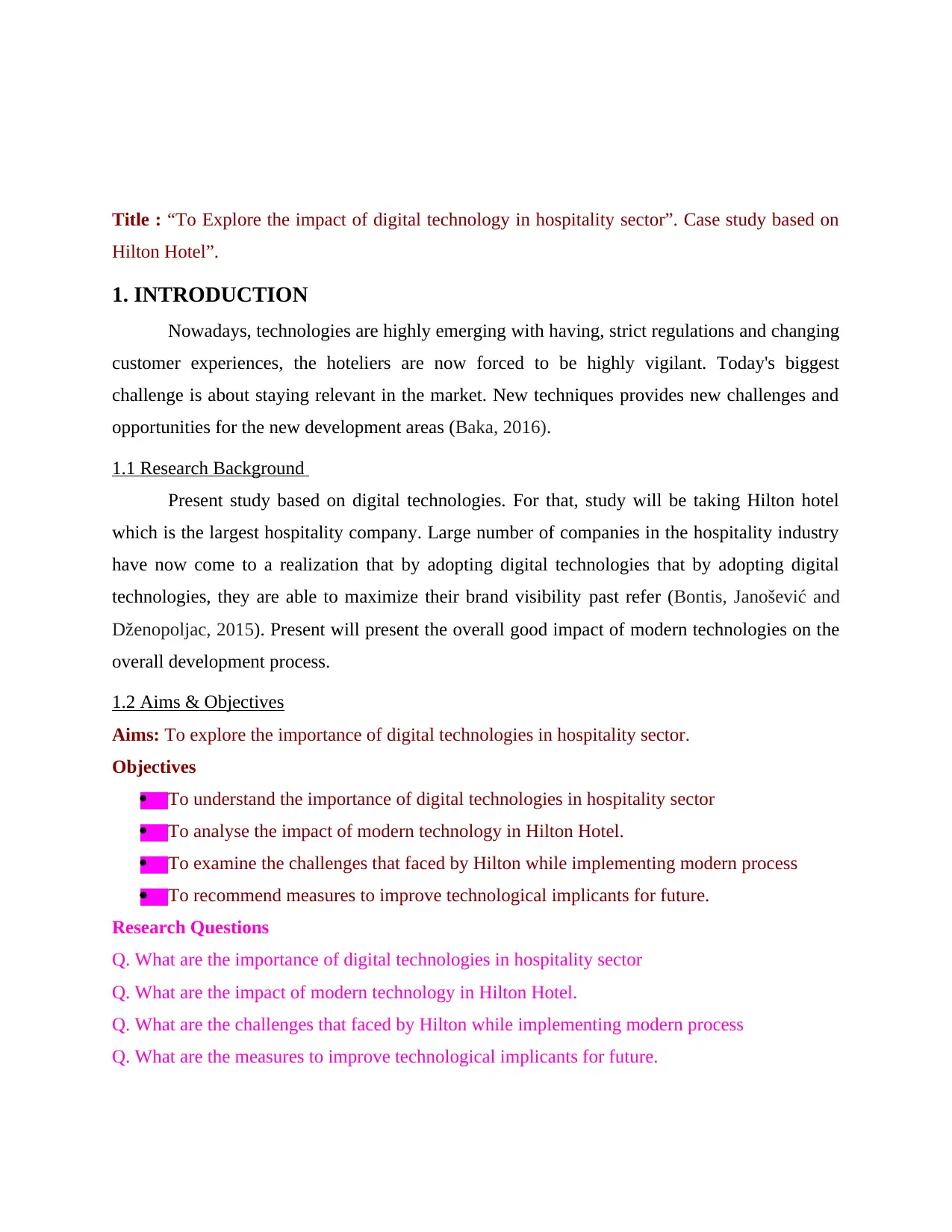
Title : “To Explore the impact of digital technology in hospitality sector”. Case study based on
Hilton Hotel”.
1. INTRODUCTION
Nowadays, technologies are highly emerging with having, strict regulations and changing
customer experiences, the hoteliers are now forced to be highly vigilant. Today's biggest
challenge is about staying relevant in the market. New techniques provides new challenges and
opportunities for the new development areas (Baka, 2016).
1.1 Research Background
Present study based on digital technologies. For that, study will be taking Hilton hotel
which is the largest hospitality company. Large number of companies in the hospitality industry
have now come to a realization that by adopting digital technologies that by adopting digital
technologies, they are able to maximize their brand visibility past refer (Bontis, Janošević and
Dženopoljac, 2015). Present will present the overall good impact of modern technologies on the
overall development process.
1.2 Aims & Objectives
Aims: To explore the importance of digital technologies in hospitality sector.
Objectives
To understand the importance of digital technologies in hospitality sector
To analyse the impact of modern technology in Hilton Hotel.
To examine the challenges that faced by Hilton while implementing modern process
To recommend measures to improve technological implicants for future.
Research Questions
Q. What are the importance of digital technologies in hospitality sector
Q. What are the impact of modern technology in Hilton Hotel.
Q. What are the challenges that faced by Hilton while implementing modern process
Q. What are the measures to improve technological implicants for future.
Hilton Hotel”.
1. INTRODUCTION
Nowadays, technologies are highly emerging with having, strict regulations and changing
customer experiences, the hoteliers are now forced to be highly vigilant. Today's biggest
challenge is about staying relevant in the market. New techniques provides new challenges and
opportunities for the new development areas (Baka, 2016).
1.1 Research Background
Present study based on digital technologies. For that, study will be taking Hilton hotel
which is the largest hospitality company. Large number of companies in the hospitality industry
have now come to a realization that by adopting digital technologies that by adopting digital
technologies, they are able to maximize their brand visibility past refer (Bontis, Janošević and
Dženopoljac, 2015). Present will present the overall good impact of modern technologies on the
overall development process.
1.2 Aims & Objectives
Aims: To explore the importance of digital technologies in hospitality sector.
Objectives
To understand the importance of digital technologies in hospitality sector
To analyse the impact of modern technology in Hilton Hotel.
To examine the challenges that faced by Hilton while implementing modern process
To recommend measures to improve technological implicants for future.
Research Questions
Q. What are the importance of digital technologies in hospitality sector
Q. What are the impact of modern technology in Hilton Hotel.
Q. What are the challenges that faced by Hilton while implementing modern process
Q. What are the measures to improve technological implicants for future.
⊘ This is a preview!⊘
Do you want full access?
Subscribe today to unlock all pages.

Trusted by 1+ million students worldwide
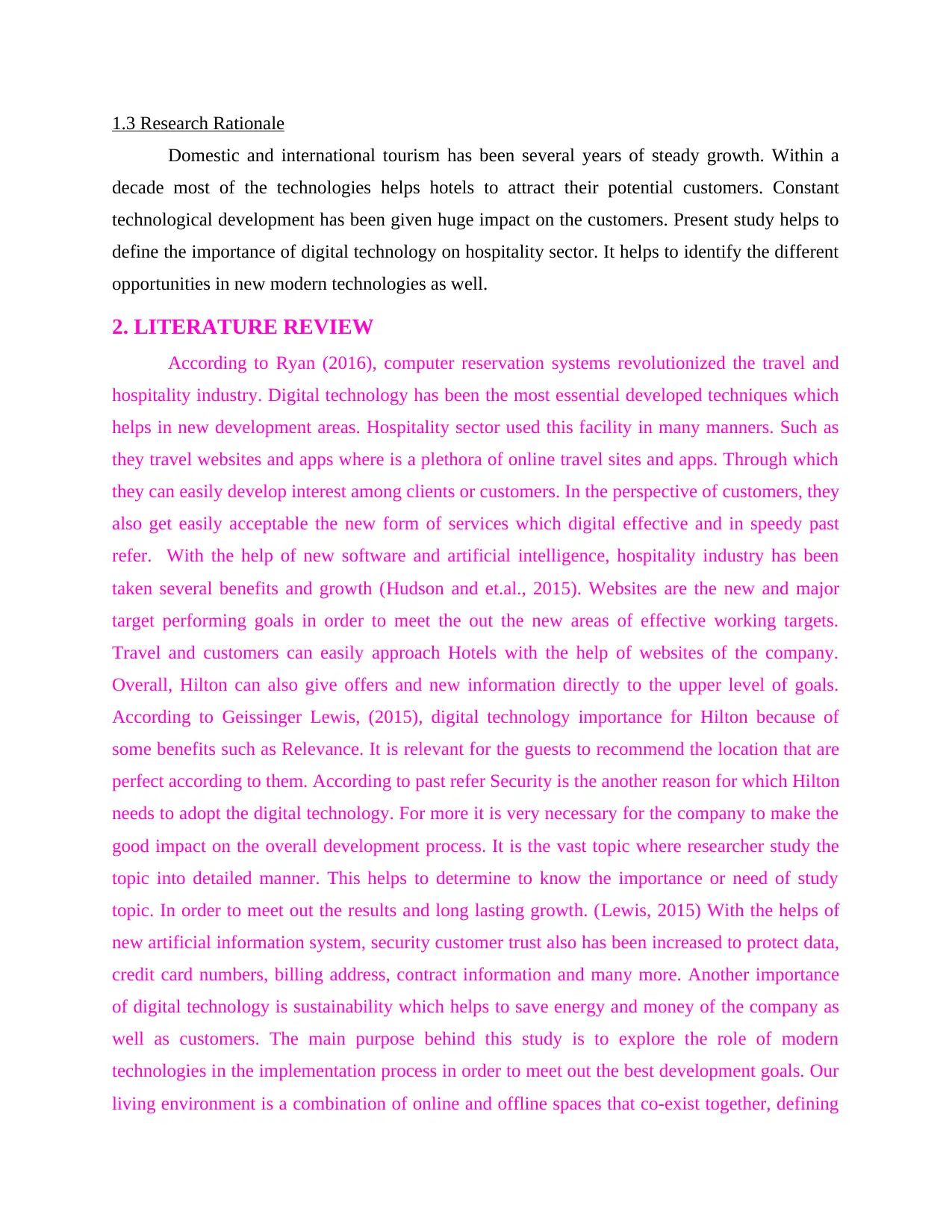
1.3 Research Rationale
Domestic and international tourism has been several years of steady growth. Within a
decade most of the technologies helps hotels to attract their potential customers. Constant
technological development has been given huge impact on the customers. Present study helps to
define the importance of digital technology on hospitality sector. It helps to identify the different
opportunities in new modern technologies as well.
2. LITERATURE REVIEW
According to Ryan (2016), computer reservation systems revolutionized the travel and
hospitality industry. Digital technology has been the most essential developed techniques which
helps in new development areas. Hospitality sector used this facility in many manners. Such as
they travel websites and apps where is a plethora of online travel sites and apps. Through which
they can easily develop interest among clients or customers. In the perspective of customers, they
also get easily acceptable the new form of services which digital effective and in speedy past
refer. With the help of new software and artificial intelligence, hospitality industry has been
taken several benefits and growth (Hudson and et.al., 2015). Websites are the new and major
target performing goals in order to meet the out the new areas of effective working targets.
Travel and customers can easily approach Hotels with the help of websites of the company.
Overall, Hilton can also give offers and new information directly to the upper level of goals.
According to Geissinger Lewis, (2015), digital technology importance for Hilton because of
some benefits such as Relevance. It is relevant for the guests to recommend the location that are
perfect according to them. According to past refer Security is the another reason for which Hilton
needs to adopt the digital technology. For more it is very necessary for the company to make the
good impact on the overall development process. It is the vast topic where researcher study the
topic into detailed manner. This helps to determine to know the importance or need of study
topic. In order to meet out the results and long lasting growth. (Lewis, 2015) With the helps of
new artificial information system, security customer trust also has been increased to protect data,
credit card numbers, billing address, contract information and many more. Another importance
of digital technology is sustainability which helps to save energy and money of the company as
well as customers. The main purpose behind this study is to explore the role of modern
technologies in the implementation process in order to meet out the best development goals. Our
living environment is a combination of online and offline spaces that co-exist together, defining
Domestic and international tourism has been several years of steady growth. Within a
decade most of the technologies helps hotels to attract their potential customers. Constant
technological development has been given huge impact on the customers. Present study helps to
define the importance of digital technology on hospitality sector. It helps to identify the different
opportunities in new modern technologies as well.
2. LITERATURE REVIEW
According to Ryan (2016), computer reservation systems revolutionized the travel and
hospitality industry. Digital technology has been the most essential developed techniques which
helps in new development areas. Hospitality sector used this facility in many manners. Such as
they travel websites and apps where is a plethora of online travel sites and apps. Through which
they can easily develop interest among clients or customers. In the perspective of customers, they
also get easily acceptable the new form of services which digital effective and in speedy past
refer. With the help of new software and artificial intelligence, hospitality industry has been
taken several benefits and growth (Hudson and et.al., 2015). Websites are the new and major
target performing goals in order to meet the out the new areas of effective working targets.
Travel and customers can easily approach Hotels with the help of websites of the company.
Overall, Hilton can also give offers and new information directly to the upper level of goals.
According to Geissinger Lewis, (2015), digital technology importance for Hilton because of
some benefits such as Relevance. It is relevant for the guests to recommend the location that are
perfect according to them. According to past refer Security is the another reason for which Hilton
needs to adopt the digital technology. For more it is very necessary for the company to make the
good impact on the overall development process. It is the vast topic where researcher study the
topic into detailed manner. This helps to determine to know the importance or need of study
topic. In order to meet out the results and long lasting growth. (Lewis, 2015) With the helps of
new artificial information system, security customer trust also has been increased to protect data,
credit card numbers, billing address, contract information and many more. Another importance
of digital technology is sustainability which helps to save energy and money of the company as
well as customers. The main purpose behind this study is to explore the role of modern
technologies in the implementation process in order to meet out the best development goals. Our
living environment is a combination of online and offline spaces that co-exist together, defining
Paraphrase This Document
Need a fresh take? Get an instant paraphrase of this document with our AI Paraphraser
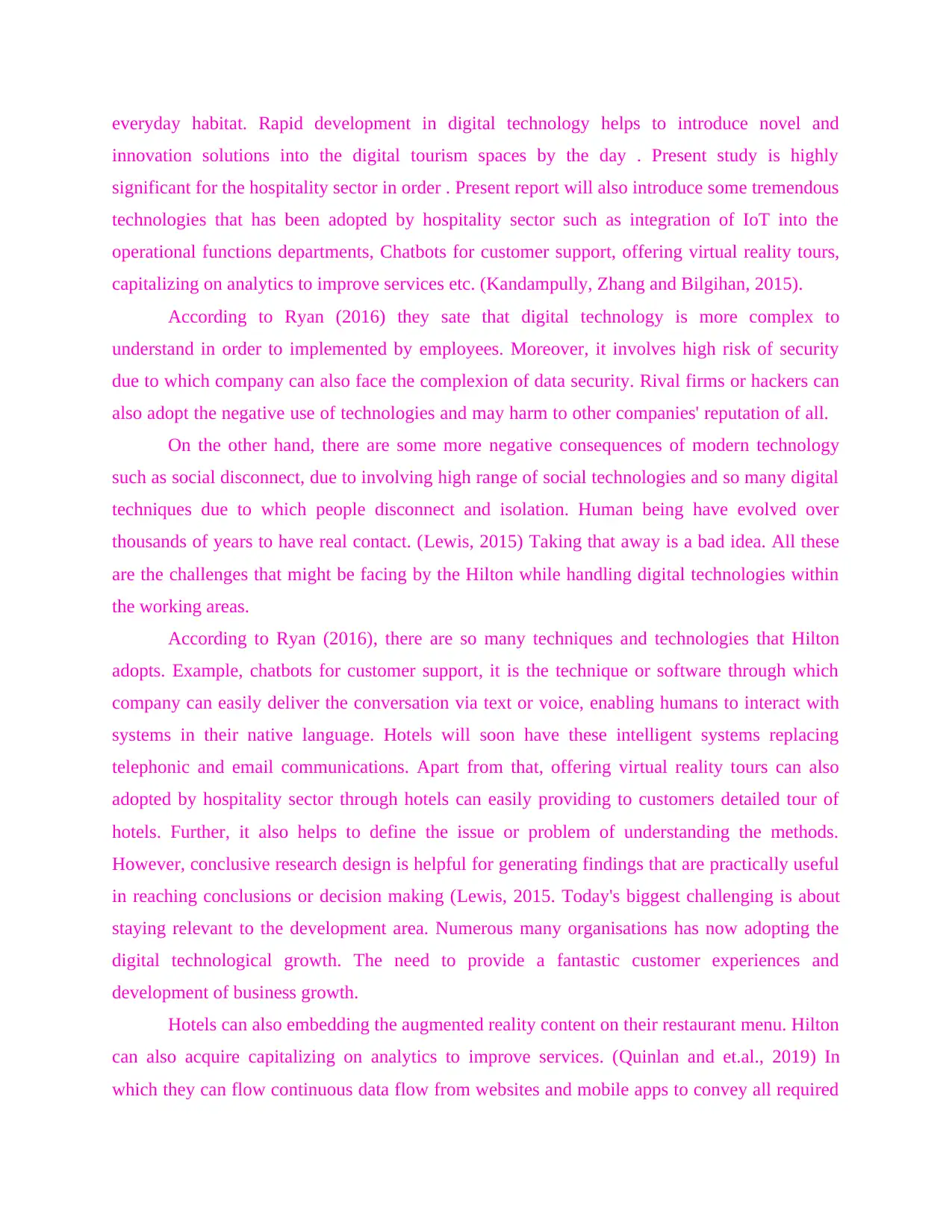
everyday habitat. Rapid development in digital technology helps to introduce novel and
innovation solutions into the digital tourism spaces by the day . Present study is highly
significant for the hospitality sector in order . Present report will also introduce some tremendous
technologies that has been adopted by hospitality sector such as integration of IoT into the
operational functions departments, Chatbots for customer support, offering virtual reality tours,
capitalizing on analytics to improve services etc. (Kandampully, Zhang and Bilgihan, 2015).
According to Ryan (2016) they sate that digital technology is more complex to
understand in order to implemented by employees. Moreover, it involves high risk of security
due to which company can also face the complexion of data security. Rival firms or hackers can
also adopt the negative use of technologies and may harm to other companies' reputation of all.
On the other hand, there are some more negative consequences of modern technology
such as social disconnect, due to involving high range of social technologies and so many digital
techniques due to which people disconnect and isolation. Human being have evolved over
thousands of years to have real contact. (Lewis, 2015) Taking that away is a bad idea. All these
are the challenges that might be facing by the Hilton while handling digital technologies within
the working areas.
According to Ryan (2016), there are so many techniques and technologies that Hilton
adopts. Example, chatbots for customer support, it is the technique or software through which
company can easily deliver the conversation via text or voice, enabling humans to interact with
systems in their native language. Hotels will soon have these intelligent systems replacing
telephonic and email communications. Apart from that, offering virtual reality tours can also
adopted by hospitality sector through hotels can easily providing to customers detailed tour of
hotels. Further, it also helps to define the issue or problem of understanding the methods.
However, conclusive research design is helpful for generating findings that are practically useful
in reaching conclusions or decision making (Lewis, 2015. Today's biggest challenging is about
staying relevant to the development area. Numerous many organisations has now adopting the
digital technological growth. The need to provide a fantastic customer experiences and
development of business growth.
Hotels can also embedding the augmented reality content on their restaurant menu. Hilton
can also acquire capitalizing on analytics to improve services. (Quinlan and et.al., 2019) In
which they can flow continuous data flow from websites and mobile apps to convey all required
innovation solutions into the digital tourism spaces by the day . Present study is highly
significant for the hospitality sector in order . Present report will also introduce some tremendous
technologies that has been adopted by hospitality sector such as integration of IoT into the
operational functions departments, Chatbots for customer support, offering virtual reality tours,
capitalizing on analytics to improve services etc. (Kandampully, Zhang and Bilgihan, 2015).
According to Ryan (2016) they sate that digital technology is more complex to
understand in order to implemented by employees. Moreover, it involves high risk of security
due to which company can also face the complexion of data security. Rival firms or hackers can
also adopt the negative use of technologies and may harm to other companies' reputation of all.
On the other hand, there are some more negative consequences of modern technology
such as social disconnect, due to involving high range of social technologies and so many digital
techniques due to which people disconnect and isolation. Human being have evolved over
thousands of years to have real contact. (Lewis, 2015) Taking that away is a bad idea. All these
are the challenges that might be facing by the Hilton while handling digital technologies within
the working areas.
According to Ryan (2016), there are so many techniques and technologies that Hilton
adopts. Example, chatbots for customer support, it is the technique or software through which
company can easily deliver the conversation via text or voice, enabling humans to interact with
systems in their native language. Hotels will soon have these intelligent systems replacing
telephonic and email communications. Apart from that, offering virtual reality tours can also
adopted by hospitality sector through hotels can easily providing to customers detailed tour of
hotels. Further, it also helps to define the issue or problem of understanding the methods.
However, conclusive research design is helpful for generating findings that are practically useful
in reaching conclusions or decision making (Lewis, 2015. Today's biggest challenging is about
staying relevant to the development area. Numerous many organisations has now adopting the
digital technological growth. The need to provide a fantastic customer experiences and
development of business growth.
Hotels can also embedding the augmented reality content on their restaurant menu. Hilton
can also acquire capitalizing on analytics to improve services. (Quinlan and et.al., 2019) In
which they can flow continuous data flow from websites and mobile apps to convey all required
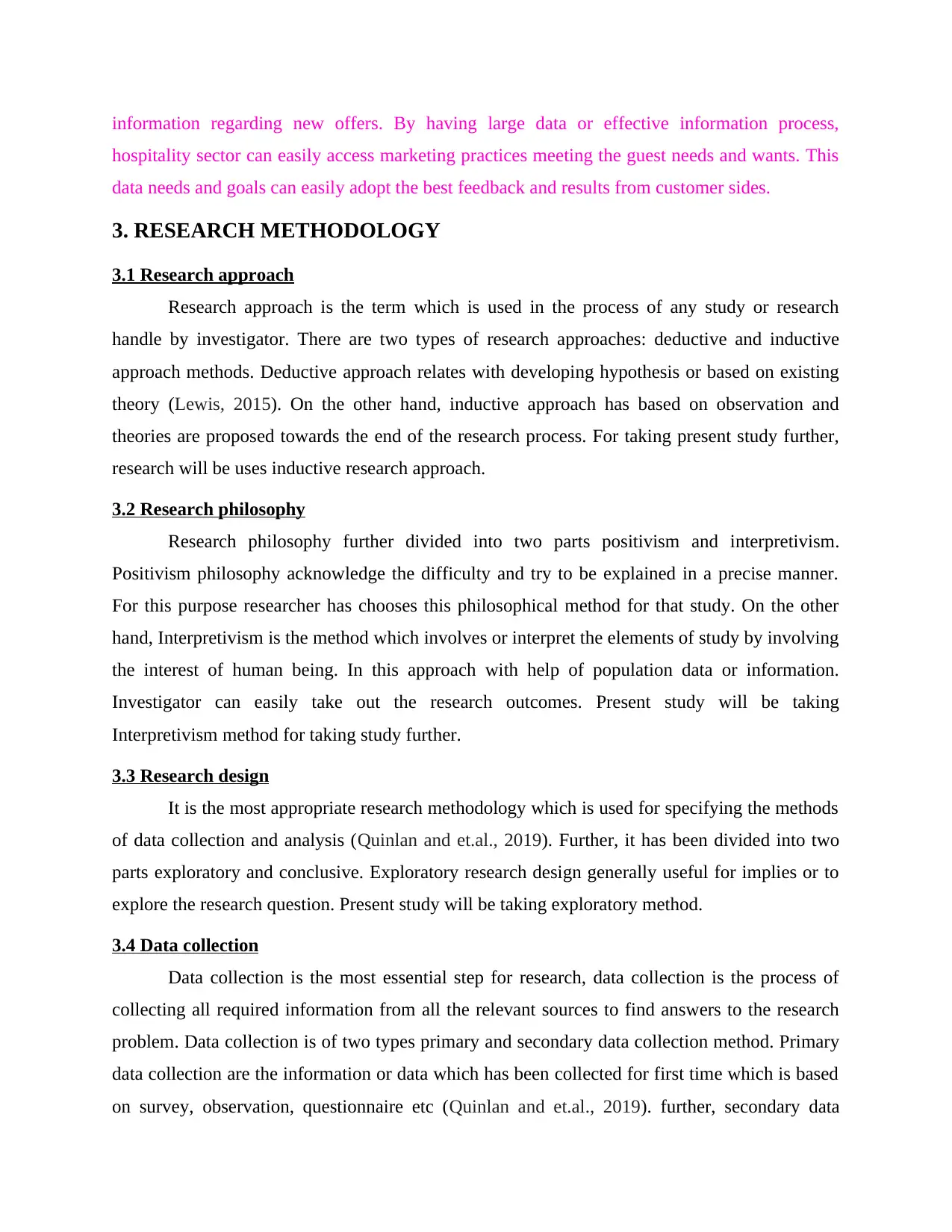
information regarding new offers. By having large data or effective information process,
hospitality sector can easily access marketing practices meeting the guest needs and wants. This
data needs and goals can easily adopt the best feedback and results from customer sides.
3. RESEARCH METHODOLOGY
3.1 Research approach
Research approach is the term which is used in the process of any study or research
handle by investigator. There are two types of research approaches: deductive and inductive
approach methods. Deductive approach relates with developing hypothesis or based on existing
theory (Lewis, 2015). On the other hand, inductive approach has based on observation and
theories are proposed towards the end of the research process. For taking present study further,
research will be uses inductive research approach.
3.2 Research philosophy
Research philosophy further divided into two parts positivism and interpretivism.
Positivism philosophy acknowledge the difficulty and try to be explained in a precise manner.
For this purpose researcher has chooses this philosophical method for that study. On the other
hand, Interpretivism is the method which involves or interpret the elements of study by involving
the interest of human being. In this approach with help of population data or information.
Investigator can easily take out the research outcomes. Present study will be taking
Interpretivism method for taking study further.
3.3 Research design
It is the most appropriate research methodology which is used for specifying the methods
of data collection and analysis (Quinlan and et.al., 2019). Further, it has been divided into two
parts exploratory and conclusive. Exploratory research design generally useful for implies or to
explore the research question. Present study will be taking exploratory method.
3.4 Data collection
Data collection is the most essential step for research, data collection is the process of
collecting all required information from all the relevant sources to find answers to the research
problem. Data collection is of two types primary and secondary data collection method. Primary
data collection are the information or data which has been collected for first time which is based
on survey, observation, questionnaire etc (Quinlan and et.al., 2019). further, secondary data
hospitality sector can easily access marketing practices meeting the guest needs and wants. This
data needs and goals can easily adopt the best feedback and results from customer sides.
3. RESEARCH METHODOLOGY
3.1 Research approach
Research approach is the term which is used in the process of any study or research
handle by investigator. There are two types of research approaches: deductive and inductive
approach methods. Deductive approach relates with developing hypothesis or based on existing
theory (Lewis, 2015). On the other hand, inductive approach has based on observation and
theories are proposed towards the end of the research process. For taking present study further,
research will be uses inductive research approach.
3.2 Research philosophy
Research philosophy further divided into two parts positivism and interpretivism.
Positivism philosophy acknowledge the difficulty and try to be explained in a precise manner.
For this purpose researcher has chooses this philosophical method for that study. On the other
hand, Interpretivism is the method which involves or interpret the elements of study by involving
the interest of human being. In this approach with help of population data or information.
Investigator can easily take out the research outcomes. Present study will be taking
Interpretivism method for taking study further.
3.3 Research design
It is the most appropriate research methodology which is used for specifying the methods
of data collection and analysis (Quinlan and et.al., 2019). Further, it has been divided into two
parts exploratory and conclusive. Exploratory research design generally useful for implies or to
explore the research question. Present study will be taking exploratory method.
3.4 Data collection
Data collection is the most essential step for research, data collection is the process of
collecting all required information from all the relevant sources to find answers to the research
problem. Data collection is of two types primary and secondary data collection method. Primary
data collection are the information or data which has been collected for first time which is based
on survey, observation, questionnaire etc (Quinlan and et.al., 2019). further, secondary data
⊘ This is a preview!⊘
Do you want full access?
Subscribe today to unlock all pages.

Trusted by 1+ million students worldwide
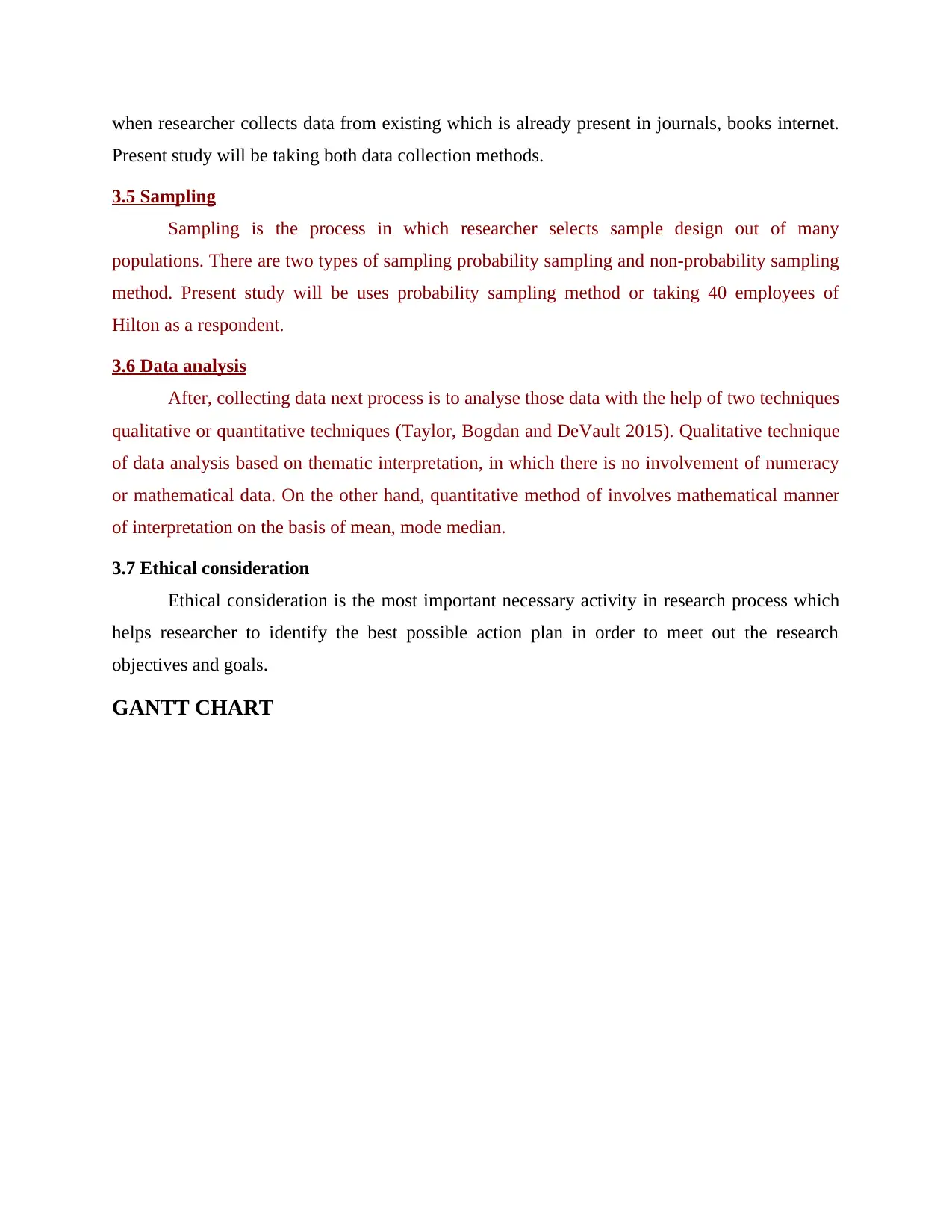
when researcher collects data from existing which is already present in journals, books internet.
Present study will be taking both data collection methods.
3.5 Sampling
Sampling is the process in which researcher selects sample design out of many
populations. There are two types of sampling probability sampling and non-probability sampling
method. Present study will be uses probability sampling method or taking 40 employees of
Hilton as a respondent.
3.6 Data analysis
After, collecting data next process is to analyse those data with the help of two techniques
qualitative or quantitative techniques (Taylor, Bogdan and DeVault 2015). Qualitative technique
of data analysis based on thematic interpretation, in which there is no involvement of numeracy
or mathematical data. On the other hand, quantitative method of involves mathematical manner
of interpretation on the basis of mean, mode median.
3.7 Ethical consideration
Ethical consideration is the most important necessary activity in research process which
helps researcher to identify the best possible action plan in order to meet out the research
objectives and goals.
GANTT CHART
Present study will be taking both data collection methods.
3.5 Sampling
Sampling is the process in which researcher selects sample design out of many
populations. There are two types of sampling probability sampling and non-probability sampling
method. Present study will be uses probability sampling method or taking 40 employees of
Hilton as a respondent.
3.6 Data analysis
After, collecting data next process is to analyse those data with the help of two techniques
qualitative or quantitative techniques (Taylor, Bogdan and DeVault 2015). Qualitative technique
of data analysis based on thematic interpretation, in which there is no involvement of numeracy
or mathematical data. On the other hand, quantitative method of involves mathematical manner
of interpretation on the basis of mean, mode median.
3.7 Ethical consideration
Ethical consideration is the most important necessary activity in research process which
helps researcher to identify the best possible action plan in order to meet out the research
objectives and goals.
GANTT CHART
Paraphrase This Document
Need a fresh take? Get an instant paraphrase of this document with our AI Paraphraser
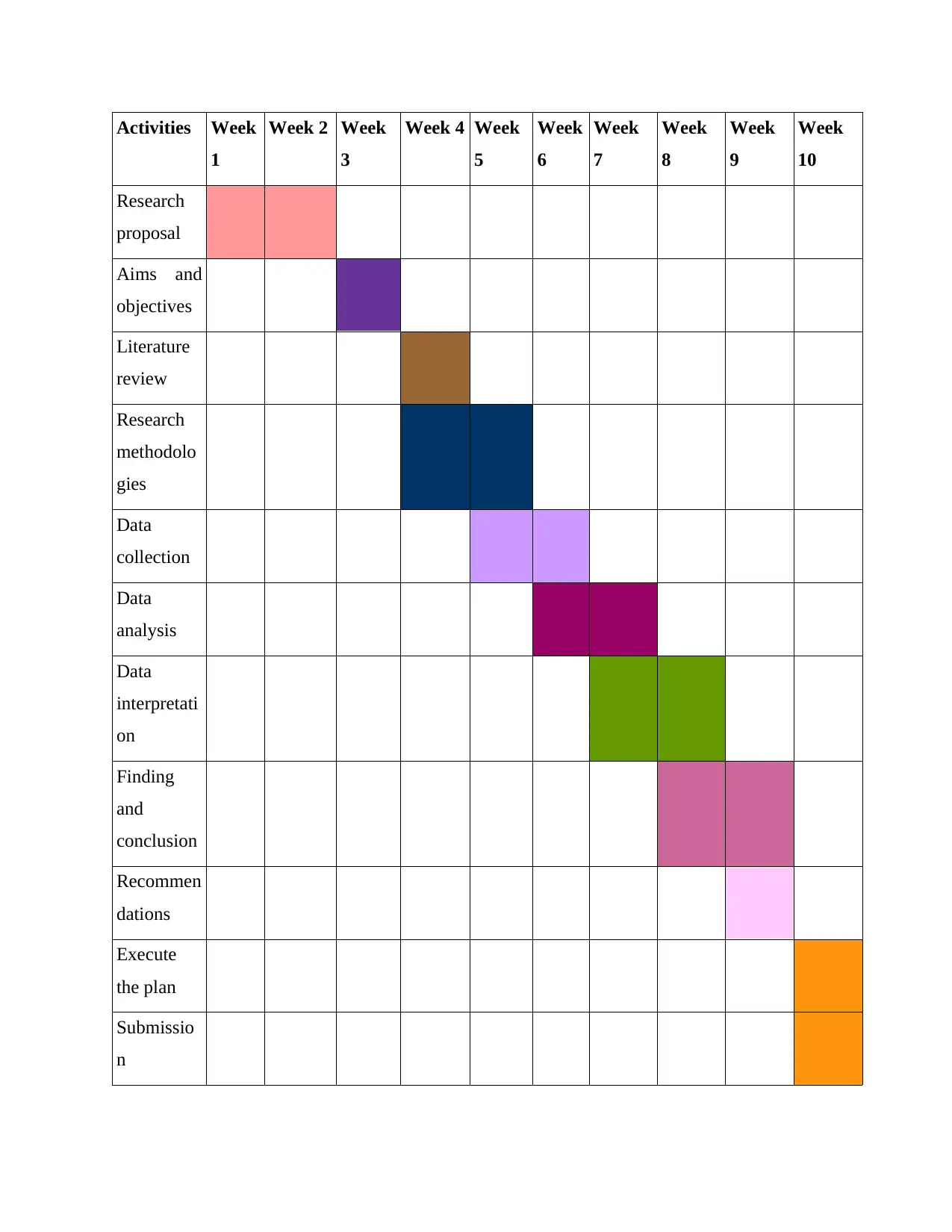
Activities Week
1
Week 2 Week
3
Week 4 Week
5
Week
6
Week
7
Week
8
Week
9
Week
10
Research
proposal
Aims and
objectives
Literature
review
Research
methodolo
gies
Data
collection
Data
analysis
Data
interpretati
on
Finding
and
conclusion
Recommen
dations
Execute
the plan
Submissio
n
1
Week 2 Week
3
Week 4 Week
5
Week
6
Week
7
Week
8
Week
9
Week
10
Research
proposal
Aims and
objectives
Literature
review
Research
methodolo
gies
Data
collection
Data
analysis
Data
interpretati
on
Finding
and
conclusion
Recommen
dations
Execute
the plan
Submissio
n
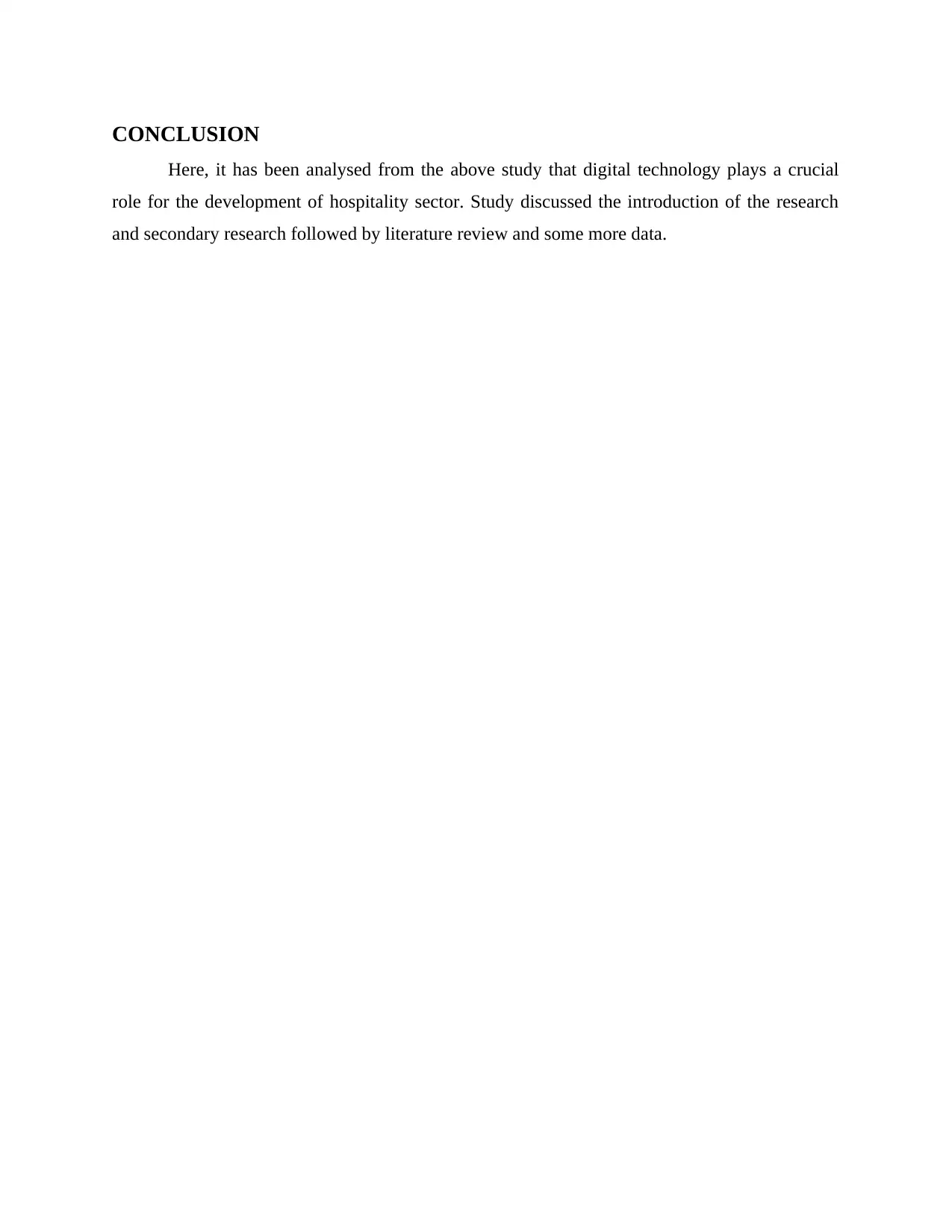
CONCLUSION
Here, it has been analysed from the above study that digital technology plays a crucial
role for the development of hospitality sector. Study discussed the introduction of the research
and secondary research followed by literature review and some more data.
Here, it has been analysed from the above study that digital technology plays a crucial
role for the development of hospitality sector. Study discussed the introduction of the research
and secondary research followed by literature review and some more data.
⊘ This is a preview!⊘
Do you want full access?
Subscribe today to unlock all pages.

Trusted by 1+ million students worldwide
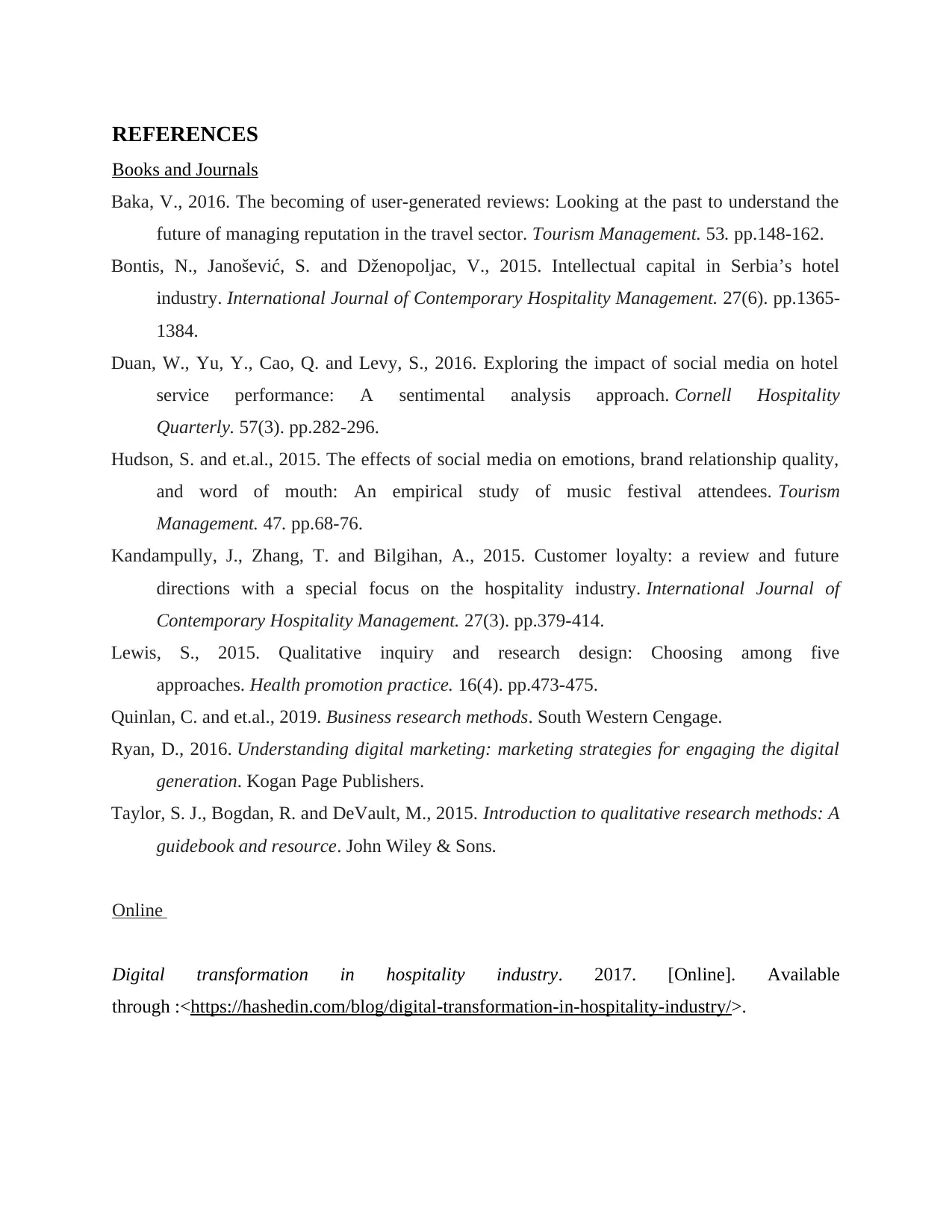
REFERENCES
Books and Journals
Baka, V., 2016. The becoming of user-generated reviews: Looking at the past to understand the
future of managing reputation in the travel sector. Tourism Management. 53. pp.148-162.
Bontis, N., Janošević, S. and Dženopoljac, V., 2015. Intellectual capital in Serbia’s hotel
industry. International Journal of Contemporary Hospitality Management. 27(6). pp.1365-
1384.
Duan, W., Yu, Y., Cao, Q. and Levy, S., 2016. Exploring the impact of social media on hotel
service performance: A sentimental analysis approach. Cornell Hospitality
Quarterly. 57(3). pp.282-296.
Hudson, S. and et.al., 2015. The effects of social media on emotions, brand relationship quality,
and word of mouth: An empirical study of music festival attendees. Tourism
Management. 47. pp.68-76.
Kandampully, J., Zhang, T. and Bilgihan, A., 2015. Customer loyalty: a review and future
directions with a special focus on the hospitality industry. International Journal of
Contemporary Hospitality Management. 27(3). pp.379-414.
Lewis, S., 2015. Qualitative inquiry and research design: Choosing among five
approaches. Health promotion practice. 16(4). pp.473-475.
Quinlan, C. and et.al., 2019. Business research methods. South Western Cengage.
Ryan, D., 2016. Understanding digital marketing: marketing strategies for engaging the digital
generation. Kogan Page Publishers.
Taylor, S. J., Bogdan, R. and DeVault, M., 2015. Introduction to qualitative research methods: A
guidebook and resource. John Wiley & Sons.
Online
Digital transformation in hospitality industry. 2017. [Online]. Available
through :<https://hashedin.com/blog/digital-transformation-in-hospitality-industry/>.
Books and Journals
Baka, V., 2016. The becoming of user-generated reviews: Looking at the past to understand the
future of managing reputation in the travel sector. Tourism Management. 53. pp.148-162.
Bontis, N., Janošević, S. and Dženopoljac, V., 2015. Intellectual capital in Serbia’s hotel
industry. International Journal of Contemporary Hospitality Management. 27(6). pp.1365-
1384.
Duan, W., Yu, Y., Cao, Q. and Levy, S., 2016. Exploring the impact of social media on hotel
service performance: A sentimental analysis approach. Cornell Hospitality
Quarterly. 57(3). pp.282-296.
Hudson, S. and et.al., 2015. The effects of social media on emotions, brand relationship quality,
and word of mouth: An empirical study of music festival attendees. Tourism
Management. 47. pp.68-76.
Kandampully, J., Zhang, T. and Bilgihan, A., 2015. Customer loyalty: a review and future
directions with a special focus on the hospitality industry. International Journal of
Contemporary Hospitality Management. 27(3). pp.379-414.
Lewis, S., 2015. Qualitative inquiry and research design: Choosing among five
approaches. Health promotion practice. 16(4). pp.473-475.
Quinlan, C. and et.al., 2019. Business research methods. South Western Cengage.
Ryan, D., 2016. Understanding digital marketing: marketing strategies for engaging the digital
generation. Kogan Page Publishers.
Taylor, S. J., Bogdan, R. and DeVault, M., 2015. Introduction to qualitative research methods: A
guidebook and resource. John Wiley & Sons.
Online
Digital transformation in hospitality industry. 2017. [Online]. Available
through :<https://hashedin.com/blog/digital-transformation-in-hospitality-industry/>.
Paraphrase This Document
Need a fresh take? Get an instant paraphrase of this document with our AI Paraphraser

2
1 out of 11
Related Documents
Your All-in-One AI-Powered Toolkit for Academic Success.
+13062052269
info@desklib.com
Available 24*7 on WhatsApp / Email
![[object Object]](/_next/static/media/star-bottom.7253800d.svg)
Unlock your academic potential
Copyright © 2020–2026 A2Z Services. All Rights Reserved. Developed and managed by ZUCOL.





